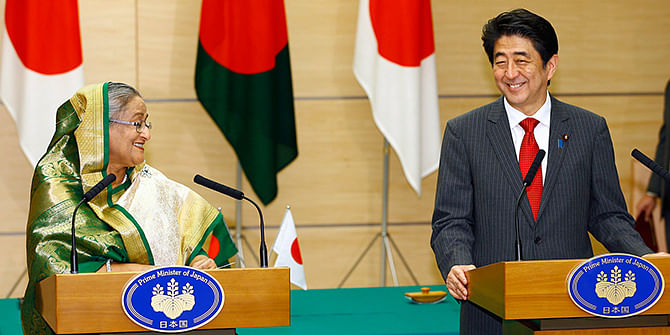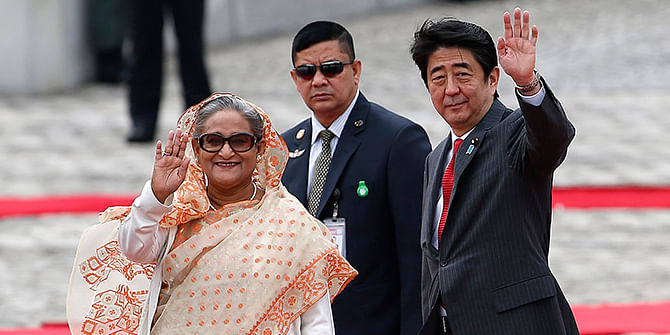PM pins hope on educated generation
PM pins hope on educated generation

Prime Minister Sheikh Hasina hoped that the educated generation will create a safe and secure world for the posterity, sweeping away all the barriers and prejudices.
“The day is not too far when educated generations will sweep away all barriers and prejudices to work closely together as one family for their combined survival, they would vie for a world of peace, not war; development, not destruction; and thus create a safe and secured world for future generations,” she said.
Hasina was addressing an audience at the Waseda University in Tokyo on 'Education and Empowerment of the Youth' today.

The president of the Waseda University, distinguished faculty members, scholars and students were, among others, present.
"I believe, it’s the duty and responsibility of our generation to ensure the empowerment of your generation to face and overcome those challenges. Education is indeed the only answer for your empowerment," she told her audience.
The prime minister said the globalised world that all share is dramatically changing into a “global village” with increasing interdependence spurred on by new innovations and discoveries.
"I feel that your generation is excited with the unique developments. However, in the process, our lives are also changing and we’re facing new challenges, including climate change and natural disasters. I also see that you’re preparing yourselves to meet the new challenges," she added.
The prime minister said Japanese Overseas Cooperative Association has been sending young volunteers to Bangladesh over the last 40 years and it is an innovative way of acquiring practical knowledge as well as in bringing countries closer.
"The volunteers have been contributing to our rural economy, education and infrastructural development. On returning to Japan, they use their experience in Bangladesh, in their society," she added.
Hasina said Japanese Prime Minister Abe’s new structure in the field of education is experience-based one that includes culture, traditions and morality. "This is undoubtedly praiseworthy, and we have no doubt that his education system would include in course of time global issues like environment, energy, earthquake, and tsunami, which are presenting new challenges to mankind."
The prime minister said on entering this prestigious seat of learning (Waseda University), the animated faces of the students and the quiet dignity of the academia, reminded her of her previous visit here in 1997, a year after on her first term as the prime minister of Bangladesh.
"The esteemed Waseda University conferred on me on that occasion the Honorary Doctorate of Law and I cherish the wonderful memories of that special day," she added.
When Bangladesh achieved independence in 1971, she said Japan was one of the first few countries to recognise it on February 4, 1972.
This bondage was cemented by the Father of the Nation, Bangabandhu Sheikh Mujibur Rahman’s historic visit to Japan in October 1973.
Since then, the premier said Japan became Bangladesh's trusted partner in development while Japan’s economic assistance helped the country's socio-economic progress, reduce poverty and achieve many of the MDGs.
Its’ involvement covers development of infrastructure, human resources, health and environment. Today, Japan has emerged as the largest development partner of Bangladesh.
Listing some of the major achievements during the last five years of her government, Hasina said the country achieved self-sufficiency in food and reached internet facility to 47.5 million users.
Hasina said Japan’s help, particularly, in education which is critical to poverty reduction and economic development has also been gratifying. "I've always believed that education is vital to face all challenges."
Of the country's total population of 160 million, 55 percent are young of whom a significant portion of them are students. Every year, a number of these students travel abroad for advanced education and research in countries as Japan.
At present, Hasina said, Bangladesh has got about 1,600 students in Japan pursuing higher studies where past experience shows on completion of their studies they return home and contribute to Bangladesh’s development in various fields of science, technology, medicine and ICT.
The speech over, Prime Minister Sheikh Hasina replied to various questions from the university students during the question-answer session.
Vice President of the University Uchida Katsuichi also spoke at the programme.